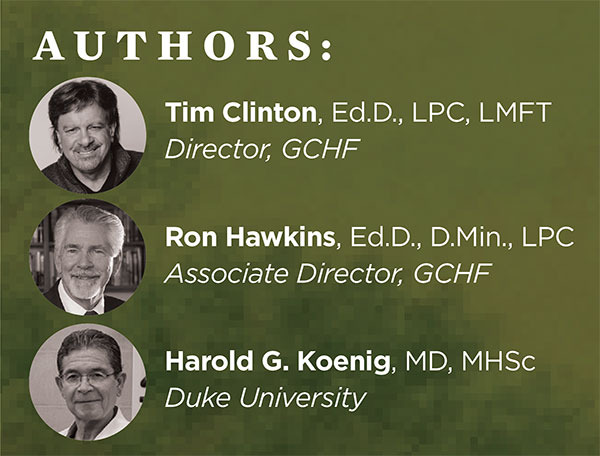INTRODUCING Liberty University’s Global Center for Human Flourishing
Today’s generations live in a highly complex and ever-changing world. From COVID-19 to political unrest to AI advances to the impact of social media, mental health issues and challenges are soaring. In fact, 23 percent of adults in the United States, or nearly 60 million people, experienced a mental illness in the past year. One in five youth reported a major depressive episode, and more than half did not receive treatment.1
An exciting development in the midst of this sea of change is the resurgence of faith in everyday life. According to a recent report from Barna, 66 percent of adults in the United States now say they have made a personal commitment to Jesus that remains important in their lives. This marks a 12-point increase since 2021 and reflects growing spiritual engagement, with Gen Z and millennials emerging as the primary drivers of this resurgence.2
Even more, there is a growing evidence-base indicating a connection between a person’s Christian faith and virtually every aspect of human health and well-being. There is an overwhelming amount of objective scientific research now showing that those with a strong religious faith, who are living out a life that exemplifies a Champion for Christ, do better in every aspect of what we call “human flourishing” — more happy and satisfied with their lives, better mental and physical health, greater meaning and purpose in life, greater character and higher values, better social relationships with family and friends, and even greater financial and material stability (or at least greater contentment with whatever they have).
The Global Flourishing Study (GFS), a five-year longitudinal study conducted by the Gallup Poll involving over 200,000 adults from 22 countries representing all major continents, has recently released Wave 1 results collected in 2022 (with four more annual waves of data collection planned). These results, reported in 34 studies, were recently published in a special issue of “Nature,” one of the most prominent science journals in the world.3 At a cost of $43.4 million, this study coordinated by the Harvard School of Public Health, Baylor University, and the Center for Open Science is examining every aspect of flourishing mentioned above with the goal of determining the characteristics of those from around the world who are truly flourishing, i.e. living an abundant life (John 10:10), in spite of whatever aversive conditions they may be facing.
Among the characteristics being measured is religious involvement. In each of the studies reporting results in “Nature,” the religious characteristic examined was frequency of religious attendance. The initial cross-sectional findings indicate that those who are more actively engaged in a religious community, whether currently or during their childhood (up to age 12), are experiencing significantly greater flourishing in every domain of mental, social, and physical health, and greater psychological well-being, better social relationships, greater meaning and purpose in life, greater optimism, more volunteering and helping of those in need, more charitable donations, better health behaviors, better self-rated health, and even greater financial well-being, despite having a lower household income.
The mission of the new Global Center for Human Flourishing (GCHF) at Liberty University is to create an environment throughout the university for students, faculty, and staff that is characterized by flourishing in all of the aspects described above. We are currently planning to conduct several randomized controlled trials over the next decade to examine the impact of a series of programmatic activities on individual flourishing, institutional flourishing, and spiritual commitment, all based on the two Great Commandments that Jesus emphasized in the Gospels. The interventions will focus on (1) deepening a relationship with God, (2) loving your neighbor through kindness, (3) expressing appreciation to others, (4) being grateful, (5) strengthening character, (6) becoming more forgiving, (7) becoming more humble, and (8) attention to the physical body and brain health.
Each of these are established interventions with a strong evidence-base demonstrating an impact on shaping disciples for Christ and thereby enhancing human flourishing (both on an individual and community basis). Once we identify the most effective interventions from the above studies (and publish the results in academic peer-reviewed journals), we plan to implement these programs throughout the Liberty University community. The goal of the GCHF is to not only demonstrate that a focus on such program activities can create a flourishing environment at Liberty — making it a leader in redefining human flourishing through a faith-informed perspective — but also encourage the implementation of these programs at other Christian universities and hopefully at secular universities throughout the country and world, advancing God’s Kingdom work here on earth for this generation and many to come.
The accomplishment of these goals will require a team effort from everyone (faculty, students, and staff) at Liberty University. With that and with God’s grace and blessings, we look expectantly to the road ahead.

1. Mental Health America. (2024, December). State of mental health in America report 2024. Mental Health America. https://mhanational.org/wp-content/uploads/2024/12/2024-State-of-Mental-Health-in-America-Report.pdf
2. Barna Group. (2025, April 7). Belief in Jesus rises, fueled by younger adults. Barna. https://www.barna.com/research/belief-in-jesus-rises/
3. Nature. (2025, April 30). Global flourishing study – Wave I. Nature. https://www.nature.com/collections/eaeicjffaf




